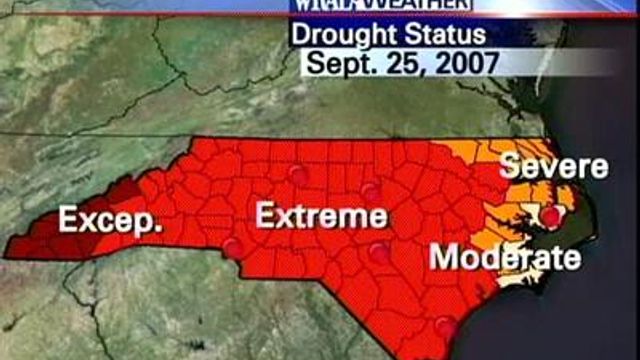State Officials 'Scared' by Drought
Grim prospects for rain are starting to frighten state officials as the drought gripping North Carolina shows little prospect of relenting.
Posted — Updated"We are scared because we have the potential, at least, for a dry winter," State Climatologist Ryan Boyles said following a meeting of the North Carolina Drought Management Advisory Council. "We are on our way to be worse than 2002 and probably on our way to having the worst drought on record."
Three-quarters of the state's counties are in extreme drought, the drought panel said Thursday in its weekly report. Another dozen counties are experiencing severe drought conditions, while eight counties in the western end of the state are in the worst category – exceptional drought.
The only changes from last week's report were Hyde County moving from severe drought to moderate drought and Beaufort County moving from extreme drought to severe drought.
On Thursday, Gov. Mike Easley dispatched water conservation teams from the Department of Environment and Natural Resources to work with local communities hit hardest by the drought to explore and implement ways to minimize water consumption and extend available resources.
Short-term forecasts don't look promising for rain, WRAL Meteorologist Elizabeth Gardner said, adding that North Carolina needs a consistent pattern of fronts bringing rain across the state to break the drought.
Falls Lake, the primary water source for Raleigh and several Wake County towns, is down about 6 feet from normal levels and is only 2 feet above its all-time low level, which was reached in 2002.
The lake's quality water capacity – the amount of water it contains that doesn't need heavy pretreatment – is down to 45 percent, while Jordan Lake, the primary water source for Cary and other area towns, has about 42 percent of its quality water capacity, officials said.
"Does this mean we're going to run out of water in Falls Lake sometime in January? No," said Terry Brown, of the Army Corps of Engineers, which manages the lake. "At zero percent (quality water capacity) ... we basically have 36½ feet of lake left at that point (to tap) on an emergency basis, on a very high conservation-type use."
Still, Dale Crisp, director of Raleigh's Public Utilities Department, said that, without significant rainfall, the city might implement Stage 2 water restrictions, which would ban all outdoor watering, as early as next month to conserve its dwindling water supply.
"(It) sounds like we are going to have to move to Stage 2 because the drought does plan to continue for several months," Crisp said. "I would say certainly in the next two months we'll be doing that and maybe even next month."
Stage 1 restrictions, which went into effect Aug. 28, have resulted in a 16 percent reduction in daily water consumption, officials said.
"If we eliminate irrigation altogether ... then it could result in another significant drop in our customer demand, which would increase the amount of water-supply-days remaining out there," Crisp said.
But City Manager Russell Allen said he doesn't think Stage 2 restrictions will be needed, saying Stage 1 limits were working.
• Credits
Copyright 2024 by Capitol Broadcasting Company. All rights reserved. This material may not be published, broadcast, rewritten or redistributed.





